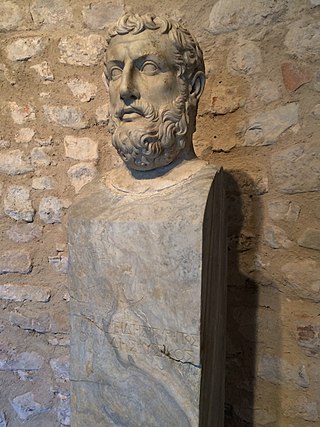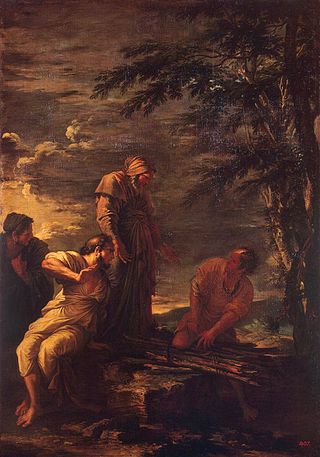Related Research Articles

Plato was an ancient Greek philosopher of the Classical period who is considered a foundational thinker in Western philosophy and an innovator of the written dialogue and dialectic forms. He raised problems for what became all the major areas of both theoretical philosophy and practical philosophy, and was the founder of the Platonic Academy, a philosophical school in Athens where Plato taught the doctrines that would later become known as Platonism.

Parmenides of Elea was a pre-Socratic Greek philosopher from Elea in Magna Graecia.

Protagoras was a pre-Socratic Greek philosopher and rhetorical theorist. He is numbered as one of the sophists by Plato. In his dialogue Protagoras, Plato credits him with inventing the role of the professional sophist.
Gorgias was an ancient Greek sophist, pre-Socratic philosopher, and rhetorician who was a native of Leontinoi in Sicily. Along with Protagoras, he forms the first generation of Sophists. Several doxographers report that he was a pupil of Empedocles, although he would only have been a few years younger. W. K. C. Guthrie writes that "Like other Sophists, he was an itinerant that practiced in various cities and giving public exhibitions of his skill at the great pan-Hellenic centers of Olympia and Delphi, and charged fees for his instruction and performances. A special feature of his displays was to ask miscellaneous questions from the audience and give impromptu replies." He has been called "Gorgias the Nihilist" although the degree to which this epithet adequately describes his philosophy is controversial.
Ancient Greek philosophy arose in the 6th century BC. Philosophy was used to make sense of the world using reason. It dealt with a wide variety of subjects, including astronomy, epistemology, mathematics, political philosophy, ethics, metaphysics, ontology, logic, biology, rhetoric and aesthetics. Greek philosophy continued throughout the Hellenistic period and later evolved into Roman philosophy.

Parmenides is one of the dialogues of Plato. It is widely considered to be one of the most challenging and enigmatic of Plato's dialogues. The Parmenides purports to be an account of a meeting between the two great philosophers of the Eleatic school, Parmenides and Zeno of Elea, and a young Socrates. The occasion of the meeting was the reading by Zeno of his treatise defending Parmenidean monism against those partisans of plurality who asserted that Parmenides' supposition that there is a one gives rise to intolerable absurdities and contradictions. The dialogue is set during a supposed meeting between Parmenides and Zeno of Elea in Socrates' hometown of Athens. This dialogue is chronologically the earliest of all as Socrates is only nineteen years old here. It is also notable that he takes the position of the student here while Parmenides serves as the lecturer.
The Statesman, also known by its Latin title, Politicus, is a Socratic dialogue written by Plato. The text depicts a conversation among Socrates, the mathematician Theodorus, another person named Socrates, and an unnamed philosopher from Elea referred to as "the Stranger". It is ostensibly an attempt to arrive at a definition of "statesman," as opposed to "sophist" or "philosopher" and is presented as following the action of the Sophist.

Angela Hunter "Angie" Hobbs is a British philosopher and academic, who specialises in Ancient Greek philosophy and ethics. She is Professor of the Public Understanding of Philosophy at the University of Sheffield.
The Sophist is a Platonic dialogue from the philosopher's late period, most likely written in 360 BC. In it the interlocutors, led by Eleatic Stranger employ the method of division in order to classify and define the sophist and describe his essential attributes and differentia vis a vis the philosopher and statesman. Like its sequel, the Statesman, the dialogue is unusual in that Socrates is present but plays only a minor role. Instead, the Eleatic Stranger takes the lead in the discussion. Because Socrates is silent, it is difficult to attribute the views put forward by the Eleatic Stranger to Plato, beyond the difficulty inherent in taking any character to be an author's "mouthpiece".

Myles Fredric Burnyeat was an English scholar of ancient philosophy.
This page is a list of topics in ancient philosophy.
David Neil Sedley FBA is a British philosopher and historian of philosophy. He was the seventh Laurence Professor of Ancient Philosophy at Cambridge University.
Commentaries on Plato refers to the great mass of literature produced, especially in the ancient and medieval world, to explain and clarify the works of Plato. Many Platonist philosophers in the centuries following Plato sought to clarify and summarise his thoughts, but it was during the Roman era, that the Neoplatonists, in particular, wrote many commentaries on individual dialogues of Plato, many of which survive to the present day.
The theory of Forms, theory of Ideas, Platonic idealism, or Platonic realism is a philosophical theory of metaphysics developed by the Classical Greek philosopher Plato. The theory suggests that the physical world is not as real or true as "Forms". According to this theory, Forms—conventionally capitalized and also commonly translated as "Ideas"—are the non-physical, timeless, absolute, and unchangeable essences of all things, of which objects and matter in the physical world are merely imitations. Plato speaks of these entities only through the characters of his dialogues who sometimes suggest that these Forms are the only objects of study that can provide knowledge. The theory itself is contested from within Plato's dialogues, and it is a general point of controversy in philosophy. Nonetheless, the theory is considered to be a classical solution to the problem of universals.
C. D. C. Reeve is a philosophy professor at the University of North Carolina at Chapel Hill. He works primarily in Ancient Greek philosophy, especially Plato and Aristotle. He has also published work in the philosophy of sex and love, and on film. He has translated many Ancient Greek texts, mostly by Plato and Aristotle.
Socrates the Younger was an ancient Athenian philosopher. Ancient texts suggest that he was a young student of the elder Socrates and later a cohort of Plato. He is best remembered for his depiction in Plato's Statesman, and scholars have suggested that he had ties to Academic and Pythagorean philosophy.
Mary Margaret Anne McCabe, known as M. M. McCabe, is emerita professor of ancient philosophy at King's College London. She has written books on Plato and other ancient philosophers, including the pre-Socratics, Socrates and Aristotle.

Christopher James Rowe OBE is a British classical scholar. He is Professor Emeritus in the Department of Classics and Ancient History of Durham University, England, where he was Head of Department 2004–2008. He is a former President of the Classical Association, and was appointed OBE in 2009 for "services to scholarship".
Kenneth M. Sayre was an American philosopher who spent most of his career at the University of Notre Dame (ND). His early career was devoted mainly to philosophic applications of artificial intelligence, cybernetics, and information theory. Later on his main interests shifted to Plato, philosophy of mind, and environmental philosophy. His retirement in 2014 was marked by publication of a history of ND's Philosophy Department, Adventures in Philosophy at Notre Dame.
David Bolotin is an American classical scholar and Tutor Emeritus at St. John's College in Santa Fe. He is known for his works on ancient Greek philosophy.
References
- 1 2 3 4 5 6 7 8 9 10 "Curriculum Vitae" (PDF). Brown University. Retrieved 1 April 2014.
- 1 2 "The Directory of Research and Researchers at Brown: Mary Louise Gill". Brown University. Retrieved 1 April 2014.
- ↑ Halper, Edward C. (1992). "Aristotle on Substance: The Paradox of Unity (review)". Journal of the History of Philosophy. 30 (3): 444–446. doi:10.1353/hph.1992.0047.
- 1 2 3 Lee, Jong Hwan (2013). "Philosophos: Plato's Missing Dialogue by Mary Louise Gill". Journal of the History of Philosophy. 51 (4): 675–676. doi:10.1353/hph.2013.0082.
- ↑ Aufderheide, J. (22 October 2013). "Philosophos: Plato's Missing Dialogue". The Philosophical Quarterly. 64 (254): 154–156. doi:10.1093/pq/pqt001.